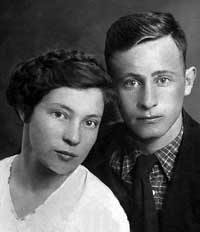Lev Gurevich was born in 1920 in the Jewish town of Tatarsk (in Smolensk Oblast). His father Solomon was a cobbler. The Gurevich family soon moved to the town of Yartsevo (near Smolensk), where the children could receive a better education.
In 1937, Lev Gurevich moved to Moscow and began to study at the Faculty of Physics and Mathematics of the Moscow State Pedagogical Institute.
On June 22, 1941, the day of the Nazi invasion of the USSR, Lev Gurevich was taking the final exams at the Institute. The students, swept up by a tide of patriotism, were eager to get to the front. Lev Gurevich was no exception, and he volunteered to serve in the People's Militia.
The division in which Gurevich served was initially ordered to dig anti-tank trenches in Smolensk Oblast. Until the end of October, its men held off the enemy at the Desna River line in that oblast. However, the forces were unequal: The poorly armed Soviet soldiers could not resist the onslaught of the well-equipped and trained troops of the Wehrmacht. A great number of the militiamen died, and the survivors were taken prisoner.
Thousands of POWs were brought to the area of the town of Roslavl (Smolensk Oblast), where they were held in terrible conditions in a local potato field. The Germans then drove the prisoners toward Smolensk, killing the weak and the laggards on the way. Tens of thousands of POWs were assembled in the central square in Smolensk, where the captors attempted to sort them out according to nationality. Lev Gurevich, who knew what the Germans were doing to the Jews, and whose facial features were not overtly "Semitic", was able to join the "Russian" group of prisoners. This group was then transported by train, in unbearable conditions, to the area of the city of Baranovichy. This was the location of the notoriousN337 POW camp.
Along with 55,000 other inmates, Lev Gurevich was held in this camp in abominable conditions from late October 1941 until May 10, 1942. People were dying from various illnesses on a daily basis, and an additional 720 would be killed every day in the gas vans. Lev may be said to have been lucky: Over this 6-month period, he fell ill with typhus, but survived; the Sonderführer failed to identify him as a Jew, and he was able to get assigned to work in the fields. This happened after he had worked up the courage and addressed a soldier in German, declaring that he wished to work there. In the end, it was this assignment that saved his life. On May 10, 1942, Gurevich was one of a group of POWs that left the territory of the camp. While passing along a narrow road near a lake, he begged off to go to relieve himself and ran away. He was able to lose himself in the wooded terrain, and soon joined the partisans, having been given directions by some locals. The partisans were initially distrustful of Gurevich: They found it hard to believe that a Jew could survive in that camp and escape on his own. Eventually, however, Lev Gurevich was able to convince them of his innocence, and he soon won the reputation of a brave soldier. Shortly thereafter, he became the commander of a mounted reconnaissance unit. Gurevich was wounded in one of the partisan operations, but returned to active duty after being treated in a partisan hospital. In summer 1944, the unit in which Lev Gurevich served joined the Red Army, and he continued his service there. In the course of the war, Gurevich was awarded the Order of the Red Star; the Order of the Patriotic War, 1st Class, and some medals. After his discharge from the military, Gurevich moved to Minsk and began to work in the educational system, eventually being awarded the prestigious Soviet title of "Honored Teacher of Belarus." His sister, Esfir Gurevich, served as a nurse at a military hospital throughout the war.







